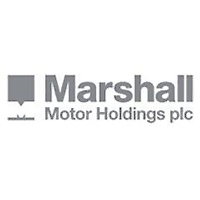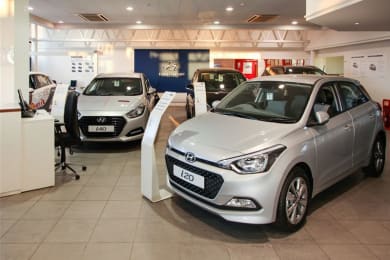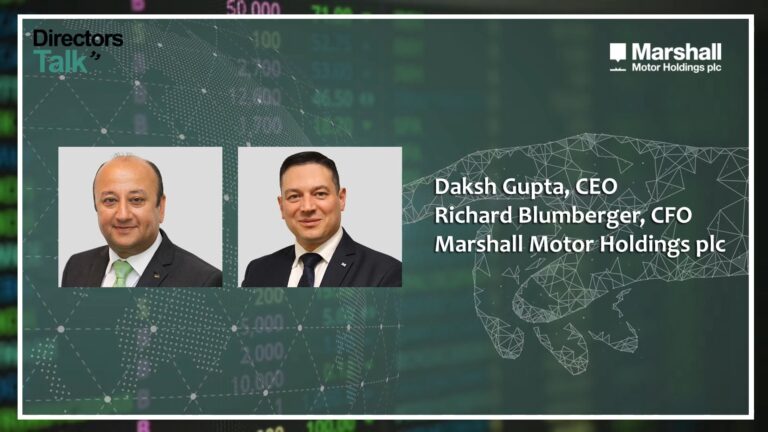Marshall Motor Holdings PLC (LON:MMH) Chief Executive Officer Daksh Gupta and Chief Financial Officer Mark Raban caught up with DirectorsTalk for an exclusive interview to discuss their annual results for the year ended 31st December 2017
Q1: Daksh, a pretty impressive report published the other day, what are the highlights for 2017?
A1: So, we announced our results on Wednesday 14th and delighted to be able to share that we’ve had an outstanding year, delighted to report that the group’s delivered another set of record results, this was both at revenue and at PBT level and we’ve also outperformed the market and have taken positive actions to prepare the group for the future.
Revenues were up 19.5% as we enjoyed the full-year benefit of Ridgeway which we acquired in May 2016 and despite a more challenging car market, on a like-for-like basis, we achieved good growth of 3.5%. Profit before Tax at £29.1 million was up 14.4% against the prior year and I’m also pleased to report that all of our key revenue streams enjoyed good like-for-like growth as well as our key operational KPI’s outperforming the market.
So, if you look at revenues, we were up 1% on new, used up 7%, after sales up 2.3% so all very pleasing and all on a like-for-like basis. Whilst our new retail sales were marginally down by 2.6%, this was a strong performance in the context of a market where retail registrations were down 6.8%. We also enjoyed an excellent used car performance with unit sales up 5.2% and this was a great performance when you consider the outperformance we achieved in new and the fact that the used car market was down 1.1%.
At the AGM in May, we’ll be recommending a final dividend of 4.25p per share and if approved, that would bring the full-year dividend to 6.4p and that’s up 16.4% on the prior year.
Finally, with the strategic disposal of Marshall Leasing, for gross consideration of £42.5 million, the balance sheet has been transformed as we’ve effectively eliminated our debt.
Q2: As you mentioned, you’ve continued to outperform the market, how have you managed to do that?
A2: I think it’s as a result of a very clear vision that we’ve had for the group that’s been in place for 10 years now and that vision is very simply to be the UK’s premier automotive retail group. What underpins that strategy is four key pillars, these are fast-delivering returns, putting our customers first, focussing on retailing excellent strategic growth and having a great culture with the organisation for our people.
We’ll take each one of those in turn, from a class-leading return perspective, you’ve seen the numbers, they’re outstanding sort of numbers and another set of record results for this group.
From a customer perspective, we continue to enjoy high levels of a customer advocacy and this has been the cornerstone of the Marshall brand and it’s in the DNA of the company, this is reflected in our recommendation and repeat business scores.
In terms of retailing excellence, we’ve invested significantly in our portfolio in recent years and this has enabled us to provide capacity for some of our historically constrained sites as well as provide great facilities for our customers to experience the brands that we partner with. We’ve also invested in our online proposition, both from a website and social media perspective, where we’re generally regarded as industry-leading, and we have strong operational focus in the company around our systems and policies, all of this is supported by our in-house MI system, Phoenix.
From a strategic growth perspective, we’ve been one of the leading consolidators in the sector in the last decade and we’ve achieved this through a carefully executed strategy for growing scale, with the right brands and the right markets. It’s worth reminding that over the last decade, we’ve bought and sold nearly 140 businesses with a very strong focus on portfolio management, so it’s not just been about acquisitions. Over that timeframe we’ve actually disposed of 36 non-core or sub-scale businesses and indeed 2017 was a good example of that with the disposal of Marshall Leasing and we took the decision to close 6 non-core sub-scale or loss-making operations as we sough to maximise the returns for our shareholders.
Finally, from a people perspective, we’ve got a great culture in the organisation, this is demonstrated by the fact that we’ve now been rated as a great place to work by our 4,000 colleagues for 8 years running now. More notably, in the last 3 years, we’ve been ranked in the top 30 large employers in the UK and in fact, in last year’s survey, we were number automotive ranked company. So, for me, I want to take this opportunity to say a big thank you to our people, people make a big difference in any organisation, there’s no doubt that our colleagues have made a real big difference to our results last year so thank you to them.
Q3: Mark, how is the balance sheet looking for Marshall Motor Holdings?
A3: The balance sheet is in good shape and I’m very pleased with it and that’s important because we know we have the capital behind us to continue to grow the group.
I think there’s three key things, first of all, we are now debt free and that’s a good position to be in, at the end of 2016, we had £119 million worth of borrowings so nearly all of that has been eradicated so that’s great.
We also have a very strong freehold property portfolio and that’s the backbone of our balance sheet, over £116 million now of freehold property which is a good place to be.
The last thing to say is following the disposal of Marshall Leasing, we have removed quite a lot of balance sheet risk, particularly around the 6,000 vehicles that we had on our balance sheet when we owned Marshall Leasing, I think that’s really important for us, particularly in the context of a more challenging diesel market.
So, overall, I think we’re in great shape and I think we can look forward to the future with a huge amount of confidence.
Q4: That said then, where do you see growth opportunities for the group going forward?
A4: Well, I think, clearly, the market is facing some challenges and that’s well documented, it’s clearly as a result of some of these economic and political uncertainties that’s out there but from our perspective, we can’t control that. Marshall Motor Holdings just need to keep doing and focus on what we can control and that’s to continue to outperform the market and you’ve seen that reflected in our numbers. 2018 is my tenth year as CEO of the group and that philosophy is what that we’ve been using throughout that time and we’ll continue with that philosophy moving forward.
I think there’s clearly a lot of noise around the new car market, that’s forecast to be down 5.8% but as we’ve done every year that I’ve been here, we’ve always outperformed the market. I’m confident we can continue to do that particularly with our strong OEM relationships and the strength of our balance portfolio, worth saying that three quarters of which now is premium or alternate premium and clearly, they’re the brands that have been taking market share in recent years. Also, worth saying that our portfolio is very much weighted towards the much affluent southern and eastern parts of the country.
The used car market remains a big opportunity for us, you saw last year the market was broadly flat and at three times the size of the new market, we do see that as a key area of opportunity for us so another reason why I was pleased with the growth that we saw, about 5.2% in unit sales last year.
After sales remains a good opportunity for us, particularly given that the vehicle parts grown in recent years and again, with our brands growing the way that they have in recent years, that’s a further opportunity for us as well.
Finally, in a challenging market, there’ll be no doubt further consolidation opportunities for us, we’ve clearly been one of the leading consolidators in the last 10 years and I’m sure when those opportunities come up, we’ll assess them and see if they make strategic sense but more importantly, whether they make financial sense for our shareholders. So, lots to go at still.








































